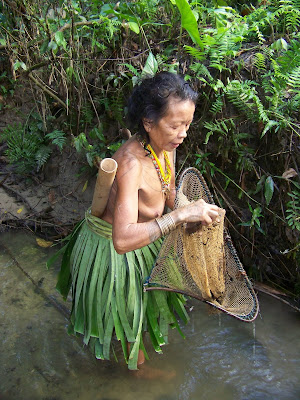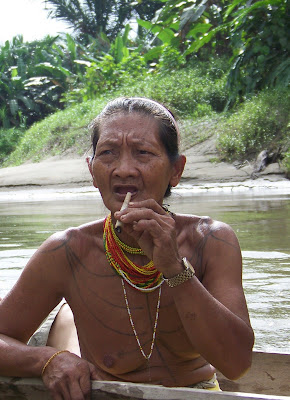
On the 13th of September 2008, the declaration on the Rights of Indigenous peoples had been carried by several states in the world, despite of the disapproval of Australia, New-Zealand and Canada. But nowadays, a lot of tribes are still forced to leave their small villages and to integrate towns or government villages near the coasts.
This is exactly what the Mentawai people are suffering from since the government of Indonesia initiated the “Mentawai relocation plan”. The terms of the bargain are the following ones : if they accept to leave their big family house called “ umas” in order to live in town in a proper way ( in a globalized way ) , they will access to free education, clothes, medical care and other promises.
Before going further to this actual problem, let us introduce you the Mentawai tribe, which certainly have the most interesting indigenous culture, and the most preserved despite of all the persecutions they are suffering from.
The Mentawai tribe is an indigeneous tribe of Siberut (Indonesia), a quite big island (4480 km2), off the Sumatra’s coast. Nowadays, the number of Mentwai is nearly 30 000.
The Mentawai people has a way of life very traditional : they hunt, with poison prepared by themselves with several natural ingredients ( leaves, pepper, roots.. ) ; the women also contribute by fishing with landing nets – and all these things are done with the respect of nature. When they kill an animal, they never forget to thank the animal soul in order to preserve the balance of the forest. This concept is part of the several shamanism concepts: men have to live in harmony with nature, because if not, the forest spirits will punish them.
a Mentawai women fishing
The Mentawai live in big and long traditional houses where all the family stay (they are approximately 25 in it). The house is elevated, in order to keeps to pigs under it. They are used to eat on the floor, so they have pierced a hole on it, so that the scraps of their meal fall down directly to the pigs.
But the particularity of the Mentawai from others tribes, -and which is the origin of all the persecutions they underwent for centuries-, is their physical appearance: all their bodies are covered with tattoos from the head to the feet (as you can see on the photos posted).
Actually, the Mentawai tribe is probably the first one in the world that has done tattoos. There are several explanations of this practice:
Some will say that it is a religious act in continuity with shamanism. In fact, they believe that everything have a soul, which is able to leave his material envelope. In consequence to that, their biggest fear is that their souls leave their bodies. That is for that reason that they tattoo their bodies, believing it will keep their soul protected, and so, they will be protected from death.
Another reason of these tattoos, which seems the more logical to occidental spirits, is that their tattoos permit them to recognize to which family the tribe’s members belong.
There is a third explanation, but less spread than the others that say that the tattoos are here to replace their clothes.
It seems logical that the tattoos’ sessions are numerous because of the size of them. It is the shaman of the family concerned that will tattoo the other members of the family, following his tattoos’ example. The ink is prepared with a kind of coal and cane sugar. The sessions are very long and hurting, but all the family assists to them, and so, they try to relax the man tattooed by telling him jokes and singing.
The other physical particularity of the Mentawai that disturbs a lot the others is that they file their teeth, so they can be pointed. And you must now think to yourself, why? Because they use to be cannibals. Now, they are not anymore because Indonesia government prohibited it, but they insist to keep this appearance, characteristic of the belonging to the tribe.
As we said before, the Mentawai have always been persecuted since the 50’s: some armed forces came into their villages and cut their hair, burnt their skins (considered as maleficent). And now, The Mentawai, also called “flower men” are now threatened to leave their forest and island for economics profits. In fact, there are a lot of forest’s exploitations that want to install in Siberut Island, which makes the Indonesia government very happy. But not only they will destroy the Mentawai tribe but also they will destroy the fauna and the flora.
The tribes with appearance very unusual have all been persecuted during ages, and now, with the globalization and all the standardization that it imposes, they are completely chased without any pangs of remorse of the governments. All these provisions made against these tribes are to much radical, and will lead to a world devoid of meaning and identity.





